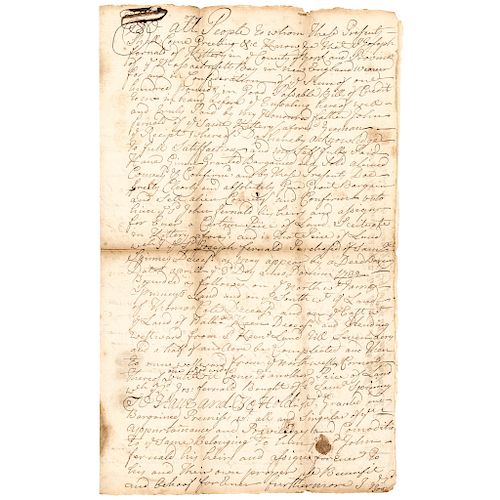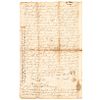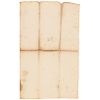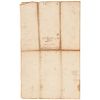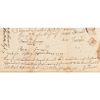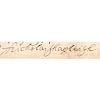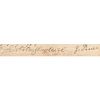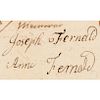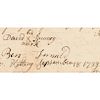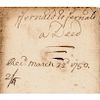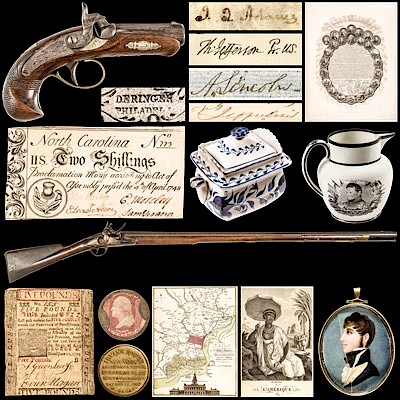1739 Colonial Kittery, County of York, Province of Massachusetts Bay Land Deed
Lot 93
Categories
Estimate:
$800 - $1,000
Absentee vs Live bid
Two ways to bid:
- Leave a max absentee bid and the platform will bid on your behalf up to your maximum bid during the live auction.
- Bid live during the auction and your bids will be submitted real-time to the auctioneer.
Bid Increments
| Price | Bid Increment |
|---|---|
| $0 | $10 |
| $200 | $20 |
| $300 | $25 |
| $500 | $50 |
| $1,000 | $100 |
| $2,000 | $200 |
| $3,000 | $250 |
| $5,000 | $500 |
| $10,000 | $1,000 |
| $20,000 | $2,000 |
| $30,000 | $2,500 |
| $50,000 | $5,000 |
| $100,000 | $10,000 |
| $200,000 | $20,000 |
| $300,000 | $25,000 |
| $500,000 | $50,000 |
About Auction
By Early American History Auctions
Oct 19, 2019
Set Reminder
2019-10-19 12:00:00
2019-10-19 12:00:00
America/New_York
Bidsquare
Bidsquare : Historic Autographs-Currency-Political-Americana-Militaria-Guns
https://www.bidsquare.com/auctions/early-american-history-auctions/historic-autographs-currency-political-americana-militaria-guns-4513
326 Lots of Rare, Historic Autographs, Americana, Civil War Era, George Washington, Abraham Lincoln, Black History, Revolutionary War Era, Colonial America, Federal Period, War of 1812, Colonial Currency, Indian Peace Medals & more... Early American History Auctions auctions@earlyamerican.com
326 Lots of Rare, Historic Autographs, Americana, Civil War Era, George Washington, Abraham Lincoln, Black History, Revolutionary War Era, Colonial America, Federal Period, War of 1812, Colonial Currency, Indian Peace Medals & more... Early American History Auctions auctions@earlyamerican.com
- Lot Description
Autographs
Nicholas Shapleigh Historic 1706 Tortured Indian Captive and Fighter Signed 1739 Colonial America Land Deed
NICHOLAS SHAPLEIGH (1680-1752). In 1706 Captured by Indians who killed his father John and carried him to Canada. He was tortured by having his fingers bitten off and then seared with hot tobacco pipes, later ransomed and returned home. Later in life as Major of Militia, Nicholas was able to amply avenge his father's death and his own inhumane treatment, during the succeeding series of Indian Wars, Justice of the Peace from 1733.
September 18, 1739-Dated Colonial America, Original Manuscript Document Signed, "Nicholas Shapleigh" as Justice of the Peace, measuring 7.5" x 12", with 4 pages, at Kittery, County of York, Province of Massachusetts Bay, Fine. Well written in brown ink on watermarked quality laid period paper and nicely signed at its conclusion.This Document is a Land Deed in which Joseph Fernald has sold his father a plot of land in Kittery (currently Maine). Signed and witnessed on second page by Joseph Fernald, Anne Fernald, David Spinney, Benjamin Fernald, Nicholas Shapleigh and Daniel Moulton witnessed and with official red wax and paper seals. Noted as reconfirmed by the keeper of records and deeds on March 22, 1750 in the left blank margin of the second page and docket on the blank reverse. A classic, very collectible Colonial Land Deed and authentically and clearly Signed by the historic Indian captive and later fierce Indian fighter, Nicholas Shapleigh. An Extremely Rare signature.
Major Nicholas Shapleigh (1680-1752). July 7, 1715 married Martha Langdon born 1692/3, the daughter of Captain Tobias and Mary (Hubbard) Landgon.
Nicholas Shapleigh served his father for seven years after becoming twenty-one years of age. He resided on the farm which formerly was owned by his great-uncle at Sandy Hill in that part of Kittery now Eliot, Maine. In 1706 he was captured by Indians (who killed his father John - see the 3rd Generation) who carried him to Canada. He was tortured by having his fingers bitten off and then seared with hot tobacco pipes. He was later ransomed and returned home. Later in life Nicholas was able to avenge amply his father's death and his own inhumane treatment in the succeeding Indian Wars.
He was several years a Major in the Militia and a Justice of the Peace in 1733 and 1734, and he held several civil offices. He was one of the six original members of the Congregational Church at Eliot (the the upper parish of Kittery) which was organized 22 June 1721. In the capacity of Justice of the Peace, he issued the warrant for the first parish meeting in the Blackberry Hill Parish at Berwick, Maine, on January 15th, 1749.
The will of Nicholas Shapleigh was dated on Jan. 17th, 1752 and proved April 6th, 1752.
- Shipping Info
-
Early American provides in-house worldwide shipping. Please contact us directly if you have questions about your specific shipping requirements.
-
- Buyer's Premium



 EUR
EUR CAD
CAD AUD
AUD GBP
GBP MXN
MXN HKD
HKD CNY
CNY MYR
MYR SEK
SEK SGD
SGD CHF
CHF THB
THB